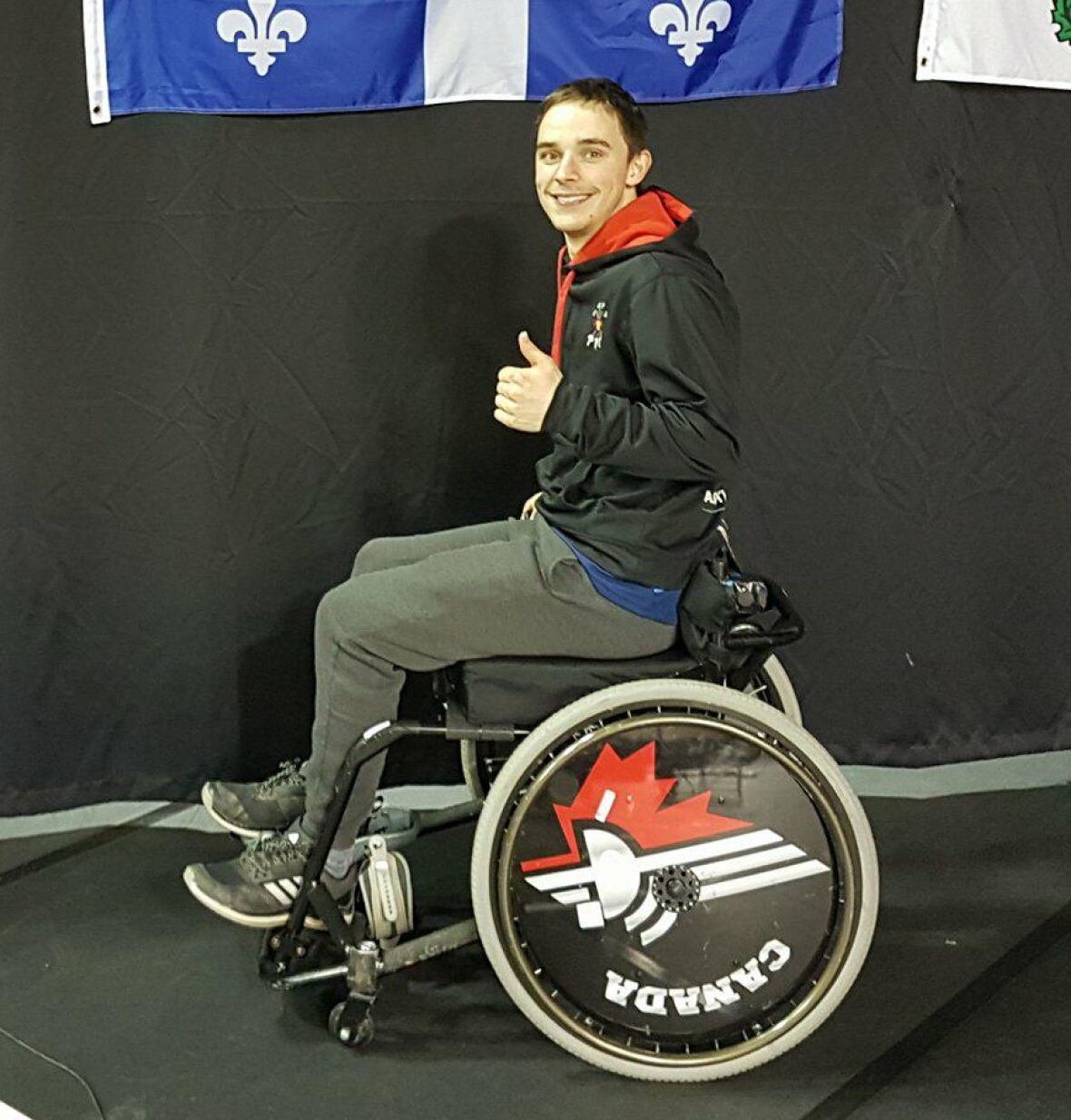‘The intensity is 100 per cent’: Sask. wheelchair fencer has Paralympic hopes after World Cup win
Ryan Rousell has been fencing for more than 10 years, wheelchair fencing for only a year and a half.

Ryan Rousel trains in Asquith, Saskatchewan and won gold at a Wheelchair Fencing World Cup in Montréal, Quebec, on April 29th, 2018. From left: Shintaro Kano (Japan), Ryan Rousell (Canada), Presenter Monique Lefebvre, Moez Elassine (France), Naoki Yasu (Japan). Photo submitted by Doug Brecht
Heidi Atter, CBC Saskatchewan May 01, 2018
Ryan Rousell says there’s no time off in wheelchair fencing. “The intensity is 100 per cent, all the time, 24/7,” Rousell said. “It’s basically two people, strapped to chairs, going at it like a fistfight with major intensity.”
After a year and a half wheelchair fencing, and many more training with able-bodied competition, the 20-year-old Saskatchewan-born Rousell has succeeded on the world stage. Rousell won gold at the Wheelchair Fencing World Cup in Montréal on April 29.

Ryan Rousell (left) won gold at the Wheelchair Fencing World Cup in Montréal on April 29, 2018. Photo submitted by Genevieve Rosseel
Now his sights are set on the pinnacle of the sport.
“I hope to qualify for the 2020 Tokyo Paralympics and I hope to repeat the same result I just did in Montréal,” Rousell said.
| Reluctant at first |
Rousell was born with cerebral palsy. He started fencing at seven in Asquith, Saskatchewan and trained for more than a decade with able-bodied teammates.
“Being a seven-year-old kid and having the chance to beat somebody with a sword sounded pretty awesome to me,” Rousell said. “It’s been a major part of my life since then.”
Ryan’s coaches first tried to convince him to try wheelchair fencing about four years ago. Originally he was hesitant.
“Being my rebellious teenager self, I didn’t want to do that because I didn’t think i needed to be in a wheelchair, to prove I could keep up with the able-bodied fencers,” Rousell said.
He said he gave in about a year and a half ago. Rousell said there aren’t many other wheelchair fencers in Saskatchewan. Much of his training is against able-bodied fencers who sit.
“In wheelchair fencing, you’re stuck at a set distance based on the length of your opponent’s arm and your arm so there is no movement back and forth like there is in regular fencing,” Rousell said.
Rousell said he finds both forms of fencing challenging.
“For me, able-bodied is challenging mostly because my legs aren’t as fine tuned as most able bodied fencers and that’s a little bit more difficult for me. However in wheelchair fencing it relies way more on your upper body strength, your core strength and your stamina in your upper body muscles,” he said.

Ryan Rousell currently trains at the Asquith Garde Fencing Academy, mainly against able-bodied fencers. Submitted by Genevieve Rosseel
| Golden ambitions |
Rousell’s break in the sport came at a provincial event in 2016. Some of the Saskatchewan coaches invited Paralympian Sylvie Morel, the scout for the national wheelchair fencing team.
Rousell’s performance earned him a trip to Amsterdam with the national team. He’s been training at wheelchair fencing since.
So far he has competed in four World Cup tournaments. April’s event in Montréal, Quebec saw him face competition from Korea, the USA, Japan, and France. In the final, he beat his Japanese opponent 15-4 to take home the gold.
The next world tournament for Rousell is the Under 23 World Championship is Warsaw, Poland in July 2018.
His ultimate goal is the 2020 Paralympics in Tokyo. To qualify, he’ll need to be ranked in the top 16 in the world. He is currently ranked in the 40s, but said his recent gold should move him higher in the ranks.
| With files from CBC Saskatchewan Morning Edition |
![]() Source CBC Saskatchewan
Source CBC Saskatchewan
Also see
Asquith, Sask. wheelchair fencer looks to make inroads at world cup Global News
Fencing Olympic hopefuls tackle myths, strategy behind ancient sport CBC Sports
Edmonton fencing phenom dominates junior world cup, sharpens skills for Olympic bid CBC Edmonton
‘the object is not to die’: Fencing workshop sells swordplay CBC Montréal
Edmonton fencing phenom dominates junior world cup, sharpens skills for Olympic bid CBC
‘I learned all my life how to fight’: Camille Chai fights to reach Paralympic dream CBC
